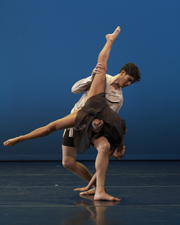
Jack Anderson
Petronio's Progress
Stephen Petronio Company
Joyce Theater, 175 Eighth Avenue at 19th Street, Chelsea
April 27-May 2, 2010
Tuesday and Wednesday at 7:30 p.m., Thursday-Saturday at 8 p.m., Sunday at
2 and 7:30 p.m.
$10-$49 Tickets: (212) 242-0800 or www.joyce.org
Reviewed by Jack Anderson April 29, 2010
Because Stephen Petronio arranged his program chronologically, beginning with
a work from 1986 and concluding with a premiere, it was possible to wonder
if he did so to reveal something specific about his choreographic development
and, if so, what that something was. He didn't tell us, even in his program
notes. Since he has created so many dances, any selection of them might be
made to fit one or another aesthetic theory or, possibly, none at all. Yet
these five pieces, as presented together, did provoke thought. Petronio kept
us guessing.
 |
| "Ghostown". Joshua Tuason and Natalie MacKessy. Photo by Frank Thompson. |
He opened the evening by dancing "#3" (1986), a solo which usually rooted him to one spot making repetitive gestures to repetitive music by Lenny Pickett. The gestures tended to be sharp, tight, sudden, and almost mechanical, and from the way he sometimes clutched himself, he seemed to imply that his body was threatening to run out of control, and he was determined to prevent it from doing so.
"MiddleSex Gorge" (1990), to music by Wire, had its own tight steps and abrupt kinetic explosions, and there was always a sense of tension between moments of constriction and release, an impression heightened by the fact that corsets were part of H. Petal's costumes for the men. At the turn of the Twentieth Century, Isadora Duncan urged women to cast off their corsets. But, now, men were wearing them, perhaps leaving audiences free to speculate about what social constraints may be confining men today.
The second half of the program began with another male solo, "Love Me Tender" (1993), danced by Julian DeLeon to the famous Elvis Presley song. Unlike "#3," this solo's movement began to loosen up, growing almost as floppy as the dangling sleeves of DeLeon's shirt. Yet, though it was loose, it never ran wild.
Looseness and wildness and varying states of bodily control and freedom were also apparent in "Foreign Import" (2007), a trio to Radiohead that sets up contrasts between two women (Wells and Shila Tirabassi), moving imperturbably in filmy costumes, and a boisterous man (Reed Luplau), who prances fiercely about them wearing very tight shorts. Yet his exertions fail to bother or impress them; ignoring him, they continue wafting calmly, while he appears puzzled by the lack of response, and the lyrics of the accompanying song confess, "I don't belong here."
People drift about in "Ghostown," Petronio's premiere to music
by Jonny Greenwood. Petronio, who can devise such sharp images, here lets
shapes blur and melt away, with groups sometimes starting to enter from the
wings, only to vanish offstage almost immediately, an effect that occurs in
some works by Trisha Bown, with whose company Petronio once danced. The stage
space is often deliberately unfocused, and the choreographic tone is melancholy.
Petronio may be reminding us that our minds are haunted houses through which
ghosts of ideas, memories, and feelings come and go. His choreography may
be broadening its emotional range.
| museums | NYTW mail | recordings | coupons | publications | classified |
